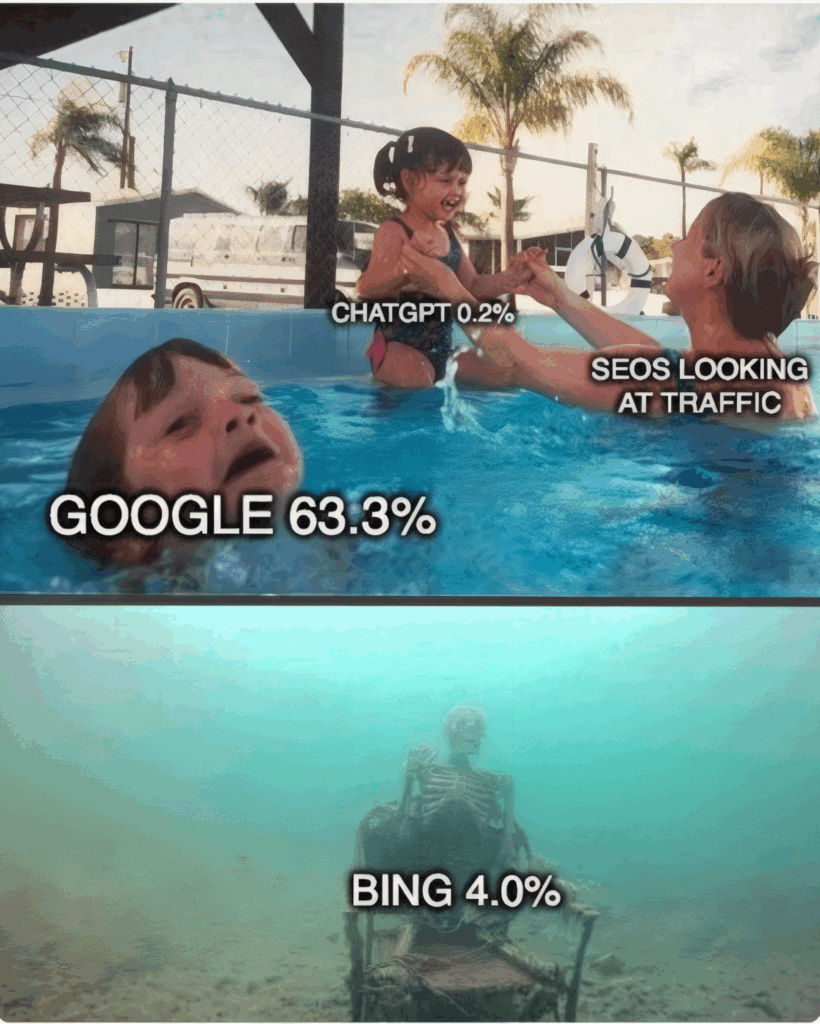The SEO world has been buzzing about ChatGPT and its supposed impact on search. Every conference talk, every LinkedIn post, every Twitter thread seems to circle back to one question: “Is AI search going to kill SEO?”
But let’s pause for a reality check.
A recent viral meme summed it up perfectly:
Google: 63.3% of search traffic (the giant pool keeping everyone afloat).
Bing: 4% (a skeleton at the bottom of the ocean alive, but ignored).
ChatGPT: 0.2% (a baby in the kiddie pool, but somehow getting all the attention).
Meanwhile, SEOs are staring at ChatGPT traffic like it’s the next gold rush while ignoring the quiet but real opportunity sitting right in front of them.
The Numbers Don’t Lie
Ivailo Yanachkov put it bluntly in his LinkedIn post:
ChatGPT = 0.2% traffic (more hype than substance right now).
Bing = 4% traffic (that’s 20 times more than ChatGPT).
Google = 63% traffic (still the big league).
So why are we treating ChatGPT like a game-changer when Bing alone has 20x its market share?
The truth: marketers love hype. It’s easier to sell the “future of AI search” than it is to talk about optimizing for Bing. But hype doesn’t close deals. Traffic and conversions do.
Bing: The Overlooked Goldmine
Bing may not be glamorous, but it’s far from dead:
It’s integrated everywhere: Windows PCs, Edge browser, Microsoft Office, and even some LinkedIn search functions.
It converts: Studies show Bing traffic often has higher conversion rates than Google because of its older, higher-income user base.
It’s consistent: While SEOs chase the next shiny AI tool, Bing delivers steady, measurable traffic that no one is fighting for.
And here’s the kicker: Bing’s 4% share of global traffic is still hundreds of millions of searches every single day. That’s a lake full of fish if you’re willing to cast your net there.
ChatGPT: The Kiddie Pool
Yes, AI search is coming. Yes, ChatGPT is exciting. But right now, it’s not a serious traffic driver. At 0.2%, it’s barely a blip on the analytics dashboard.
The danger isn’t AI search itself, it’s SEOs being distracted by it before it’s ready. Jumping too early into “AI SEO strategies” is like building a beach house during low tide. By the time the waves arrive, you may find yourself in the wrong spot.
For those interested in how AI might eventually shape real estate search, here’s a useful resource: AI Search Optimization for Real Estate. But remember the future doesn’t replace the present.

The Real Takeaway for SEOs
Google is still king. Ignore it at your own peril.
Bing is underrated. There’s real, underutilized traffic there 20x ChatGPT’s share.
ChatGPT is noise (for now). Don’t confuse hype with ROI.
The winners in SEO aren’t the ones who chase trends blindly, they’re the ones who see where the actual traffic is today, while preparing strategically for tomorrow.
So, ask yourself: are you chasing hype, or are you fishing where the fish actually are?









